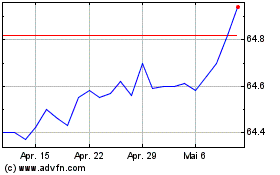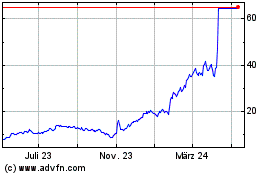Alpine Immune Sciences Announces Preclinical Data Demonstrating ALPN-202 Eliminates Tumors & Creates Persistent Tumor Resista...
17 April 2018 - 8:00PM
Business Wire
-- ALPN-202 is a potential novel
immuno-oncology therapy providing dual PD-L1/CTLA-4 antagonism with
CD28 costimulation --
-- Unique mechanism seeks to address lack of
costimulatory activity of existing immuno-oncology therapies --
-- Data Presented at 2018 American Association
for Cancer Research Annual Meeting --
Alpine Immune Sciences, Inc. (NASDAQ:ALPN), a leading
immunotherapy company focused on developing treatments for cancer
and autoimmune/inflammatory diseases, today presented preclinical
study results of its ALPN-202 immuno-oncology program. ALPN-202
will be the second product candidate to come out of the company’s
proprietary scientific platform following ALPN-101, which is
projected for an IND filing in the fourth quarter of 2018.
ALPN-202 is designed to antagonize PD-L1 and CTLA-4 while also
providing CD28 costimulation. Recent literature suggests the lack
of CD28 costimulatory signaling may be a principal reason why many
tumors do not respond to PD-L1 or CTLA-4 blockade. ALPN-202’s
ability to agonize the costimulatory receptor CD28 potentially
improves the immune system’s response to cancer.
Alpine used its proprietary scientific platform to engineer
Variant Ig Domains (vIgDs) based on CD80. Single vIgD proteins were
created capable of binding PD-L1, CTLA-4, and CD28. These vIgDs
were then fused to an Fc backbone and used in various in vitro and
in vivo studies to characterize functional activity and assess
anti-tumor activity in mice implanted with human PD-L1 transduced
tumors. Results showed:
- ALPN-202 eliminated tumors in most mice
(73% or 8/11 tumor free) compared to durvalumab, an FDA-approved
anti PD-L1 antibody (18% or 2/11 tumor free), and controls (0/11
tumor free).
- Importantly, those mice tumor free
after receiving ALPN-202 were re-challenged with tumor and 100% of
them were resistant to the newly-implanted cells without receiving
additional doses of therapy, suggesting the potential for ALPN-202
to induce anti-tumor memory.
- ALPN-202 elicited CD28 costimulation
only in the presence of PD-L1.
Scientific Support and Rationale for
ALPN-202PD-1/PD-L1 inhibitors likely are most effective only
when sufficient T cell activating signals, such as via CD28
costimulation, are present. Indeed, recent research demonstrated
CD28 costimulation appears to be required for PD-1 inhibition to
rescue exhausted T cells in some settings (Science 355:1423, 2017),
yet the CD28 ligands CD80 and/or CD86 are often poorly expressed in
tumor microenvironments. Because it provides both checkpoint
blockade and CD28 costimulation, the ALPN-202 program is therefore
well positioned to potentially be a more potent and broadly
applicable therapeutic.
“Previously published data suggest PD-1 blockade requires CD28
costimulation to work, at least in some cancers. The preclinical
data we are presenting at AACR indicate the ALPN-202 program
proteins are capable of delivering both with a single molecule,”
said Stanford Peng, M.D., Ph.D., Executive Vice President of
Research and Development and Chief Medical Officer of Alpine.
“Additionally, these data demonstrate we can modulate three targets
(PD-L1, CTLA-4, and CD28) with a single domain (in contrast to the
need for multiple targeting domains for other therapeutic formats
like bi- or tri-specific antibodies), demonstrating the potential
promise of our versatile scientific platform.”
“Our goal in oncology is to develop paradigm-shifting
therapeutics that meaningfully improve upon existing therapies like
PD-1/PD-L1 inhibitors,” said Mitchell H. Gold, M.D., Executive
Chairman and Chief Executive Officer of Alpine. “The preclinical
data presented at AACR show ALPN-202 antagonizes PD-1 and CTLA-4,
and provides a CD28 costimulatory signal, resulting in a potent
anti-tumor response. As we drive the ALPN-202 program towards the
clinic in 2019, we believe we can create the next generation of
immuno-oncology therapeutics with novel mechanisms of action using
our proprietary scientific platform.”
About Alpine Immune Sciences, Inc.Alpine Immune Sciences,
Inc. is focused on developing novel protein-based immunotherapies
using its proprietary Variant Ig Domain (vIgD) technology. Our
proprietary scientific platform is designed to interact with
multiple targets, including many present in the immune synapse.
Alpine’s vIgDs are developed using a process known as directed
evolution, which produces proteins capable of either enhancing or
diminishing an immune response and thereby may potentially apply
therapeutically to cancer, autoimmune, and inflammatory diseases.
Alpine has also developed Transmembrane Immunomodulatory Protein
(TIP) technology, based on the vIgD technology, to potentially
enhance engineered cellular therapies. For more information, visit
www.alpineimmunesciences.com.
Forward-Looking StatementsThis release contains
forward-looking statements within the meaning of Section 27A of the
Securities Act of 1933, Section 21E of the Securities Exchange Act
of 1934 and the Private Securities Litigation Reform Act of 1995.
These forward-looking statements are not based on historical fact,
and include statements regarding Alpine’s platform technology and
potential therapies. Forward-looking statements generally include
statements that are predictive in nature and depend upon or refer
to future events or conditions, and include words such as “may,”
“will,” “should,” “would,” “expect,” “plan,” “intend,” and other
similar expressions among others. These forward-looking statements
are based on current assumptions that involve risks, uncertainties
and other factors that may cause actual results, events or
developments to be materially different from those expressed or
implied by such forward-looking statements. These risks and
uncertainties, many of which are beyond our control, include, but
are not limited to: Alpine’s discovery-stage and pre-clinical
programs may not advance into the clinic or result in approved
products on a timely or cost-effective basis or at all; Alpine may
not achieve additional milestone payments pursuant to its
collaborations; the impact of competition; adverse conditions in
the general domestic and global economic markets; as well as the
other risks identified in Alpine’s filings with the Securities and
Exchange Commission. These forward-looking statements speak only as
of the date hereof and Alpine undertakes no obligation to update
forward-looking statements, and readers are cautioned not to place
undue reliance on such forward-looking statements.
“Transmembrane Immunomodulatory Protein,” “TIP,” “Variant Ig
Domain,” “vIgD”, and the Alpine logo are registered trademarks or
trademarks of Alpine Immune Sciences, Inc. in various
jurisdictions.
View source
version on businesswire.com: https://www.businesswire.com/news/home/20180417005837/en/
Investors:Pure CommunicationsCourtney Dugan,
212-257-6723cdugan@purecommunications.comorMedia:W2O GroupJennifer
Paganelli, 347-658-8290jpaganelli@w2ogroup.com
Alpine Immune Sciences (NASDAQ:ALPN)
Historical Stock Chart
Von Apr 2024 bis Mai 2024

Alpine Immune Sciences (NASDAQ:ALPN)
Historical Stock Chart
Von Mai 2023 bis Mai 2024
